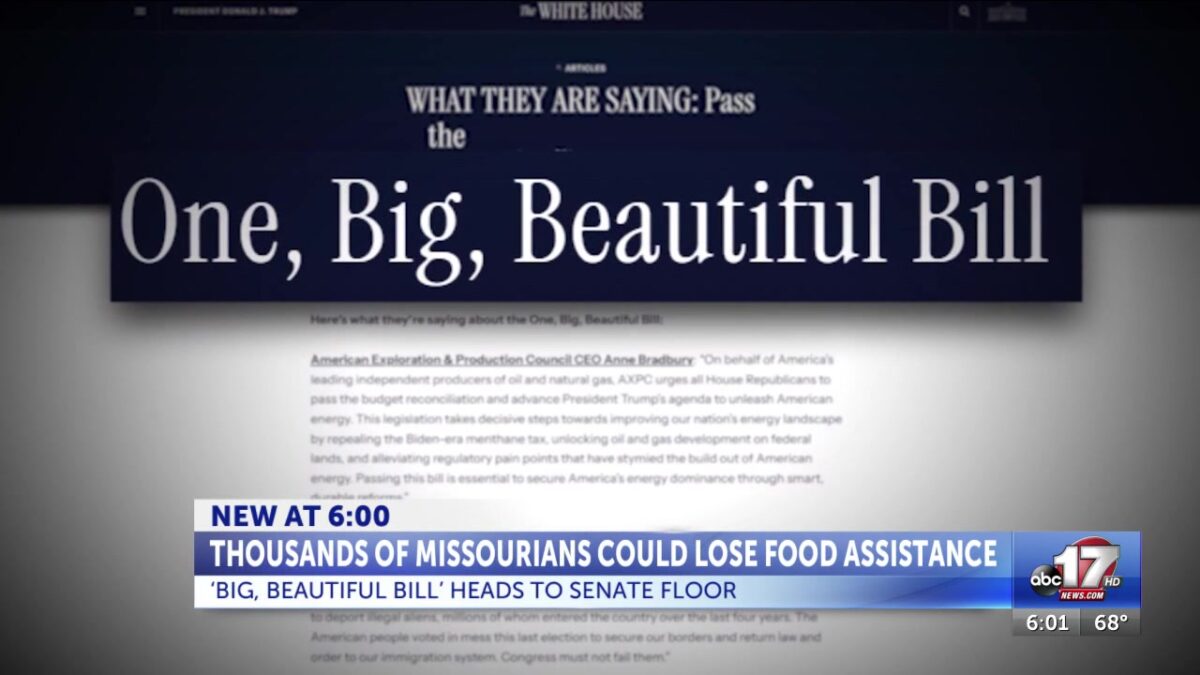Thousands of Missourians could lose food assistance under ‘big, beautiful bill’

Haley Swaino
COLUMBIA, Mo. (KMIZ)
An estimated 14,000 Missourians ages 55-64 could lose their federal food benefits if changes to the Supplemental Nutrition Assistance Program make it through the Senate.
The U.S. House last week approved the “big, beautiful bill” which includes cuts to social program budgets such as Medicaid and SNAP, known commonly as food stamps.
Millions of low-income Americans could lose food assistance under House Republicans’ tax and spending cuts package, according to a recent Congressional Budget Office analysis.
Nationwide, CBO estimates that these measures would strip roughly 3.2 million people of their food stamp benefits in an average month over the next decade.
“Across the state of Missouri, we [The Food Bank for Central & Northeast Missouri] know that about one in every seven adults is considered to be food insecure, and I think that’s pretty fair across the country too,” CEO and President of The Food Bank for Central & Northeast Missouri Lindsay Lopez said.
One of the most controversial provisions of the bill includes expanding the program’s current work requirements to adults ages 55-64.
This would mean that unless an adult meets a 20-hour-per-week work requirement or qualifies for an exemption, such as having a disability, they would only be able to receive food benefits for three months in a three-year period.
Lopez said most people receiving food assistance through the Food Bank have at least one person in their household who is employed.
“But they may just be underemployed, meaning that it’s just very difficult for them to make ends meet with the amount of money that they end up with in their paycheck once or twice a month,” Lopez said.
The Center on Budget and Policy Priorities estimates that about 14,000 Missourians ages 55-64 with no children and no disability are at risk of losing food assistance under the proposed expansion of SNAP’s work requirement, according to an analysis of SNAP quality control data for the 2022 fiscal year.
The bill is expected to undergo multiple changes in the Senate.
Republican Rep. Bob Onder, of Missouri’s 3rd District, said in a statement he was proud to vote “yes” on the bill.
“Our social safety net programs need to be protected so that they will be available for the truly needy and vulnerable,” Onder said in an email. “For that reason, eligibility should be checked regularly to prevent waste, fraud, and abuse. Likewise, able-bodied, working age adults who are able to work should do so as a condition of participation in these programs. For that reason, I support these requirements in both the food stamp (SNAP) and Medicaid programs, as embodied in the Reconciliation bill (“Big Beautiful Bill”). “
Democratic Rep. Emmanuel Cleaver, of Kansas City, issued a statement Thursday following the house approval.
“At a time when income inequality is at historic levels and working class families are pleading for relief, congressional Republicans are making the largest cuts to Medicaid and SNAP in American history, ripping healthcare and food assistance away from vulnerable families, to give another tax break that lines the pockets of billionaires like Elon Musk and Donald Trump,” Cleaver said.
The package, which aims to carry out President Donald Trump’s agenda, brings historic cuts to some of America’s safety net programs. The proposed legislation would deliver trillions in tax cuts, but at the expense of significant cuts to federal funding for food assistance and Medicaid to balance out the financial impact.
In 2023, SNAP provided aid to roughly 42 million Americans monthly, 12.6% of the U.S. population. The USDA says about 12.2% of Missouri households are food insecure.
As written, the bill would reduce federal spending on the Supplemental Nutrition Assistance Program by roughly $286 billion over the next decade, according to the CBO analysis.
The bill’s cuts could take food assistance away from families with children 7 years old or older.
Overall, 54,000 Missourians ages 18-64 with school-age children and no disability are at risk of losing food assistance under the proposed expansion of SNAP’s work requirement, according to CBPP analysis of SNAP quality control data for the 2022 fiscal year.
The vast majority of people at risk of losing SNAP would lose the assistance that allows them to purchase groceries. Research shows SNAP’s work requirement does not increase employment or earnings.